Articles
EdGEO:
Helping Teachers Teach Earth Science
Eileen Van der Flier-KellerSchool of Earth and Ocean Sciences, University of Victoria, Victoria, BC, Canada V8W 3P6
fkeller@uvic.ca
Laura Clinton
Director, PDAC Mining Matters, 135 King Street East, Toronto, ON, M5C 1G6
lclinton@pdac.ca
Fran Haidl
Saskatchewan Department of Energy and Resources, 300 – 2103 11th Avenue, Regina, SK, S4P 3Z8
fran.haidl@gov.sk.ca
SUMMARY
EdGEO is a national program that supports Earth science workshops for Canadian teachers. Geoscientists and teachers work collaboratively to develop and deliver these curriculum-linked workshops, which provide teachers with the classroom resources, enhanced knowledge, and increased confidence to teach Earth science more effectively. Grants of up to $3000 per workshop are available from EdGEO for this purpose. The ability of EdGEO to advance its vital mission relies on the generous support of scientific associations, corporations, foundations and individuals. With increased funding, EdGEO’s future will see the compilation of EdGEO lesson plans from workshops across Canada, and the development of learning activities to integrate Earth science into physics, chemistry, biology and mathematics; all these resources will be available for download from the EdGEO web site.SOMMAIRE
EdGEO est un programme national visant à aider les enseignants canadiens à créer des ateliers en sciences de la Terre. Des scientifiques des sciences de la Terre et des enseignants joignent leurs efforts pour élaborer et présenter ces ateliers adaptés à chaque niveau, dotant ainsi aux enseignants de ressources pédagogiques, de meilleures connaissances pour un enseignement plus sûr et plus efficace. À cet effet, EdGEO offre des bourses pouvant aller jusqu’à 3 000 $. Cela dit, la capacité d’EdGEO à mener à bien sa mission dépend de la générosité de dons provenant d’associations professionnelles, de sociétés, de fondations et de particuliers. Pourvu de meilleures capacités financières, EdGEO entend compiler les plans de leçon EdGEO mis au point au Canada et élaborer des activités d’apprentissage pour intégrer les sciences de la Terre à l’enseignement de la physique, de la chimie, de la biologie et des mathématiques; toutes ces ressources pourront être télécharger à partir du site Internet d’EdGEO.INTRODUCTION
1 In 1990, Ward Neale and Louisa Horne published a booklet, The Past Is the Key to the Future: A Geoscientists’ Guide to Public Awareness of Science and Technology. In this, they note that “Although all segments of society can benefit by an enhanced awareness of science and technology, the area of greatest need is the schools, particularly elementary and junior high schools”. These words and sentiments are echoed in the UNESCO 2008 Science Education Policy-making document, where it is noted that, “The fundamental factor in the improvement of students’ learning in science and technology is the quality (knowledge, skills and enthusiasm) of their teachers”.
2 What foresight the founders of Canada’s EdGEO workshop program [www.edgeo.org] had to develop a national program to encourage locally driven Earth science workshops for Canadian teachers, with the goal of building a geoscience-literate society from the children up. EdGEO does this by providing support for workshops that are developed and led by interested groups of Earth scientists and teachers. These professional development opportunities may include field, laboratory and classroom components. They provide Canadian teachers with the enhanced knowledge, classroom resources and increased confidence that enhance their delivery of Earth science curricula, and grants of up to $3000 per workshop are available from the national EdGEO program.
3 By providing educational opportunities for today’s teachers and, through them, their students, EdGEO seeks to cultivate a heightened awareness of our planet. The expected result is an improved capacity on the part of Canadians to understand the Earth and make informed decisions, especially with regard to the use of mineral and energy resources, the maintenance and remediation of the environment, and response to geological hazards.
4 There exists a critical need to provide teachers with training and resources to tackle their Earth science curricula. It is hoped that this article will encourage geoscientists and teachers across Canada to access support from EdGEO and develop local professional development workshops and field trips.
HISTORY
5 EdGEO was established in the early 1970s by the Canadian Geoscience Council, now the Canadian Federation of Earth Sciences (CFES). EdGEO is coordinated by the Canadian Geo-science Education Network (CGEN), the education arm of CFES. The CGEN is concerned with all levels of geoscience education in Canada and encourages activities designed to increase public awareness of geo-science.
6 Over the past four decades, EdGEO’s leadership has moved across the country. In each new location, dedicated geoscientists and teachers accomplished the organization’s mandate with vision and determination. Throughout this time, the mission has remained the same and the program has continued to expand and develop to reach thousands of teachers across the country.
7 The ability of EdGEO to advance its vital mission relies on the generous support of scientific associations, corporations, foundations and individuals. Support from the Canadian Society of Petroleum Geologists and its Educational Trust Fund, Canadian Geological Foundation (CGF), CFES, CGEN, Geological Association of Canada (GAC), Mineralogical Association of Canada, Canadian Society of Exploration Geophysicists and Geological Survey of Canada (GSC), in addition to several other sponsors over the past three decades, has been critical to EdGEO’s ability to serve educators and students across the nation.
8 The EdGEO web site [www.edgeo.org] serves as a promotional vehicle, helping to achieve program goals through interactive capabilities such as grant applications and reporting forms, and hosts current and past issues of the program’s annual newsletters.
EdGEO TEACHER WORKSHOPS
9 EdGEO teacher workshops are locally driven and are therefore very diverse. They focus on a wide range of Earth science topics, such as geological time, Earth resources, rocks and minerals, fossils or landforms. Some are largely field-based workshops to demonstrate and practice how field activities can be incorporated into Earth science teaching, and others emphasize hands-on activities. Many strive to include both classroom and field components. Workshops attended by local teachers are tied to the provincial/territorial curriculum whereas national workshops emphasize topics common to curricula in multiple Canadian jurisdictions.
10 An important element of each workshop is the package of resource materials provided to each participating teacher for use in the classroom. The content of this package varies for each workshop but typically includes items such as learning activities, maps, hand lenses, streak plates, magnets, rock and mineral kits, fossil sets, text books, listings of relevant web sites and posters. Such resource materials ensure that teachers have the tools necessary to teach Earth sciences effectively.
11 Earth scientists and teachers work collaboratively in developing and delivering EdGEO workshops to ensure that the hands-on and field activities and resource materials can be effectively used in the classroom and meet the needs of local teachers. Sessions are inquiry-based and interactive, incorporating practical hands-on activities to help teachers move from theory into practice. The length of these professional development opportunities ranges from two-hour sessions to several days, and can generally accommodate up to twenty-five teachers. Workshops have been presented at teachers’ conferences, province-wide professional development days, industry events, and independently.
12 Organizing committees are urged to solicit funds from local geo-science organizations, service groups and businesses. The EdGEO supplements such funds with grants of up to $3000. Teachers are generally asked to pay a modest registration fee in addition to expenses such as hotel accommodations on field trips. EdGEO grants are intended to help cover the cost of resource packages, field-trip transportation and advertising. Salaries are not covered. Grants are made on the basis of on-line applications that provide a summary and detailed budget of the proposed workshop and/or field trip. Applications are accepted throughout the year. Each is evaluated on its own merits by the national EdGEO executive committee against the established goals of the organization and the monies available.
13 Applicants are notified within three weeks of submission and EdGEO also proactively seeks enthusiastic geoscientists and invites all interested parties to submit a grant application, ideally several months prior to the planned workshop; EdGEO disburses about $15 000 annually. Many applicants are supported by generous monetary and in-kind funding, resulting in EdGEO requests for support that are far less than the $3000 maximum. Grant recipients are commonly published in the organization’s annual newsletter [www.edgeo.org/newsletters.html].
MANY DIFFERENT APPROACHES AND MODELS
14 Five examples of different workshop approaches from across the country follow.
1. Teaching Basic Geological Concepts and Environmental Geology through Field Experiences
15 Since 1994, the Nova Scotia EdGEO Workshop Committee has hosted 16, two-day field-based workshops during the month of August (Fig. 1). The workshop moves to a new location each year to ensure this unique professional development opportunity can be accessed by teachers across the province. Although this workshop targets teachers from Grades 3 to 12, over the years it has attracted participation from educators outside the classroom, including volunteer geology teachers from the Nova Scotia Museum of Natural History, employees from the Fundy Geological Museum and interpreters from Parks Canada.
16 In 2008, field trip leaders from the Nova Scotia Department of Natural Resources and the Geological Survey of Canada (GSC) presented basic geological concepts such as rocks, minerals, the rock cycle, geological time, plate tectonics, and natural resources during visits to several interesting geological sites. Geology and urban development, acid rock drainage, uranium, radon, radio-nuclides, fluorosis, and the impact of (historical) mining were introduced as key environmental topics. A tour of the Halifax Wastewater Treatment Plant gave participants the chance to consider the issues of sewage, metals, organic contaminants and water quality. An in-class session hosted by the Bedford Institute of Oceanography focused on beaches and the Halifax Harbour. A local teacher also presented a series of learning activities for use in the classroom. All participants received an extensive resource kit including books, maps, posters, lesson plans, videos and popular education materials published by the Atlantic Geoscience Society.
Figure 1. The 12th annual workshop of the Nova Scotia EdGEO Workshop Program included a field trip with a stop at the famous Peggys Cove Lighthouse to reveal key features of the distinctive Devonian granite.
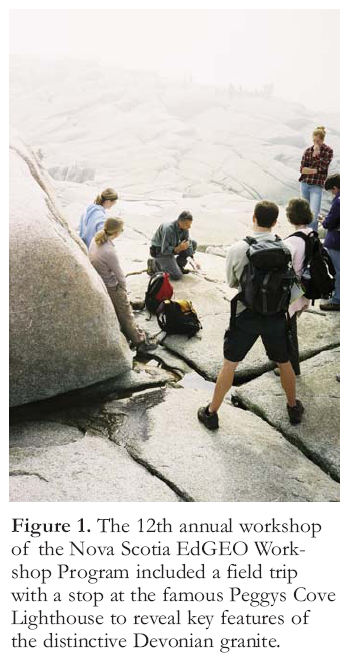
Display large image of Figure 1
17 Quotes from teachers: “This workshop was well worth taking. I am inspired, armed with activities and thought-provoking questions to use in class. Thank you so much!” “I have attended many in-services in the past 25 years. The EdGEO workshops in August and October have by far been the best organized and interesting I have attended. Keep up the good work!”
2. Connecting Teachers to the Resource Industry in the Field
18 Teachers from the Greater Toronto Area (GTA) participated in a field-based EdGEO workshop to explore the importance of the geoscape, the three-dimensional relationship between the landscape and the geology below its surface [see http://geoscape.nrcan.gc.ca/index_e.php for information on the Geoscape posters and associated teacher materials across Canada]. Field trip leaders from the Ontario Ministry of Northern Development and Mines, and Prospectors and Developers Association of Canada Mining Matters provided an overview of the geological legacy of the GTA and introduced current geoscience issues of the region. Tours of the extraction, processing, and rehabilitation aspects of aggregate operations (Fig. 2) promoted awareness of the connection between geoscience and the wise use and management of land and resources. On-site, participants studied the importance of aggregates and teamed up to examine environmental problems, concerns, and solutions associated with aggregate operations. Teachers also had an opportunity to collect samples of fossiliferous dolostone, shale and gypsum from aggregate sites. Each field trip stop included the presentation of a curriculum-linked, hands-on activity that could be reproduced in the classroom.
Figure 2. Teachers explore for fossils in Ordovician dolostone at Dufferin Aggregate’s Milton Quarry.
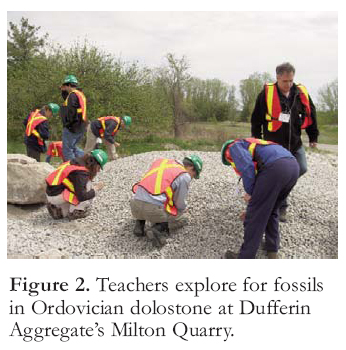
Display large image of Figure 2
19 Participants received the Geoscape Toronto poster and 24 corresponding learning activities, rocks and minerals from southern Ontario, bedrock and surficial geology maps, the books, ’Toronto Rocks: The Geological Legacy of the Toronto Region’ and ’Rock Ontario’, fact sheets about aggregate production, career profiles for the mining industry, and a card game that focuses on understanding the importance of rocks, minerals and metals in our lives.
20 Quotes from teachers: “It is opportunities like this that help me deliver the curriculum in a more informative way. My growth helps to translate into my student’s growth.” “I enjoyed the day and found it very informative. Superior to any P.A. Day activities I have been subject to. Bravo!”
3. Participating in Teachers’ Conferences
21 Over 7000 Kindergarten to Grade 12 teachers gathered in Saskatoon and Regina for SHOWCASE 2008, a professional learning conference organized by the Saskatchewan Teachers’ Federation. The EdGEO workshop leaders, including two teachers and geoscientists from the University of Saskatchewan, Saskatchewan Ministry of Energy and Resources, Saskatchewan Mining Association, Saskatchewan Geological Society, T. Rex Discovery Centre, Laramide Petro-logic Services, and Prospectors and Developers Association of Canada Mining Matters, joined forces to deliver a total of nine two-hour Earth science workshops to over 254 junior, intermediate and senior teachers. All were dynamic classroom-based sessions focused on curriculum connections in Earth science. Lectures, displays, demonstrations, and hands-on activities were used to engage teachers. Five of these workshops focused on an array of topics that included the Earth’s crust, rocks and minerals, dinosaurs, fossils, landforms and the environment. Saskatchewan resources were a major focus in the other four sessions, with expert speakers from Shore Gold, Saskatchewan Potash Corporation and Mosaic Potash.
22 Teachers returned to their schools with a wealth of resources and materials to enhance their teaching of Earth science and the resource industry. Packages included mineral, rock and fossil posters; fact sheets; Geoscape Northern and Southern Saskatchewan posters; a geological highway map; a wall-size plate tectonic map of the world; and binders with lesson plans, hands-on activities, and background information. Additional sponsorship ensured that every teacher attending the four senior sessions received a complete copy of the resource kit entitled ‘Discovering Diamonds’, and in-depth material about Saskatchewan geology and resources. Teachers who attended the sessions were also provided the opportunity to order sponsored rock and mineral kits.
23 Quotes from teachers: “You’re thinking about teachers’ needs and classroom preparation – great!” “Excellent hands-on activities to explain the basics of rocks and minerals. Terrific ideas for the classroom!” “This workshop fits right into the science course in Saskatchewan schools”
4. Creating a Strong Partnership Between Teachers and a Science Network
24 For over 10 years, teachers have assembled at the Geological Survey of Canada building in northwest Calgary to participate in curriculum-linked workshops designed to equip teachers with the knowledge and resources to deliver the Earth science curriculum with confidence. These workshops form part of an extensive suite of professional development opportunities for teachers offered by the Calgary Science Network. All workshops are jointly presented by geoscientists from the Geological Survey of Canada and by teachers experienced in the delivery of the Grades 3 and 7 Science units – Rocks and Minerals, and Planet Earth.
25 The workshops incorporate hands-on experiences with rock and mineral identification, oil and gas drilling simulation, and thrust fault demonstrations (Fig. 3), all of which are intended for use in the classroom. Opportunities to explore book and online resources, including animations and simulations, are invaluable in explaining and demonstrating difficult concepts, such as the cycling of the mantle, or seismic wave movements. The success of these long-running workshops is largely attributed to the collaboration between teachers and geoscientists. When technical understanding is married with pedagogical knowledge, the very best hands-on, discovery-based activities can be implemented and educational resources can be carefully evaluated.
Figure 3. Godfrey Nowlan demonstrates folds and thrust faults.
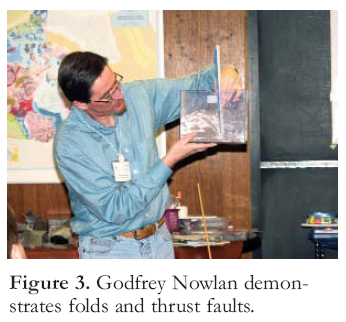
Display large image of Figure 3
26 Teachers bring to the partnership a solid understanding of the teaching profession, knowledge of the local education system, and experience as to what will work and what will not work in a classroom. Teachers are therefore best equipped to develop classroom activities and approaches. They are also well positioned to provide valuable feedback to inquiries from teachers attending the workshop (Fig. 4).
27 The geoscientist brings to the partnership knowledge of the technical subject matter, its real-world applications and related career opportunities. Teachers, especially those of lower grade levels without specific training in science, benefit from outstanding curriculum-linked, hands-on activities and the experts’ descriptions. Teachers of higher grade levels benefit from the career-related information and the interesting and relevant applications of scientific knowledge that can be used as the hooks to stimulate student interest in a topic. The geoscientist can also help provide access to information and expertise in their communities.
Figure 4. Teachers at a Calgary workshop discuss rocks.
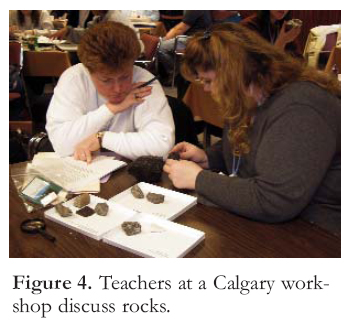
Display large image of Figure 4
28 Quotes from teachers: “The presenters created an atmosphere of collaborative learning where all teachers were encouraged to share their ideas, successes and shortcomings in addressing this unit with their students and together we became more confident as teachers.” “This was wonderful! I really like the “team” aspect – scientist and teacher! Thank you so much. This was better than the teachers’ convention!
5. Engaging Pre-service Teachers before they enter the Classroom
29 This new initiative, begun in 2005 at the University of Victoria, encourages and supports teachers in training, providing them with the resources, hands-on activity ideas and field approaches, to successfully and confidently teach Earth science in their future classrooms (Fig. 5). An EdGEO ‘Education Lab’ is offered annually to Education and Pre-Education students at the University of Victoria, as part of a first year Earth science course - EOS 120 Introduction to the Earth System II. The lab accommodates 20 students per year and runs for 11 weekly 3-hour sessions (including an education tutorial). The lab content (which is the same as for non-Education Lab students) includes plate tectonics, minerals, rocks, stratigraphy and fossils, glacial and fluvial processes and two local field trips. Topics are presented through hands-on activities, experiments, demonstrations, role-playing, literacy activities, and peer teaching grounded in constructivist methods (EDU model – explore, discuss and understand), and transferable to the K-12 classroom. The students receive, and work with, over the course of the labs, resources for their future classrooms, including a mineral kit, igneous, sedimentary and metamorphic rock kits, a fossil set, books, posters, and a lab manual that includes curriculum-linked lesson plans, activity instructions, EDU ‘leading question’ sheets, and black lines. The ‘Education Lab’ is co-sponsored by the Pacific Centre for Research in Youth, Science Teaching and Learning (CRYSTAL) an initiative funded by the Natural Sciences and Engineering Research Council of Canada (NSERC), which also supports a longitudinal study to evaluate the impact of the workshop on emerging teacher practices and interest in Earth science teaching. Please contact us if you are interested in setting up a similar Education lab in a first year Earth science course and would like a copy of the lab manual.
Figure 5. Pre-service teachers in Victoria participate in an urban geology field trip.
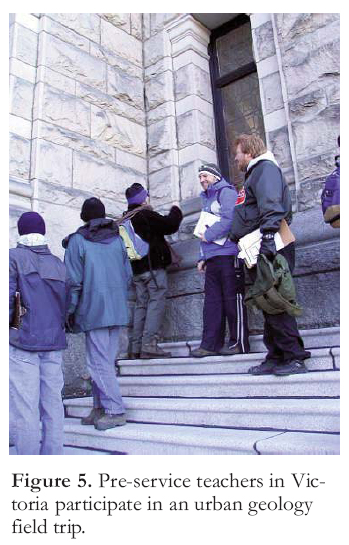
Display large image of Figure 5
30 Quotes from student teachers: “A fabulous way to present science to people who are interested in teaching. It was a great class.” “Almost everything is hands-on or a visual learning experience. It was fun, and that’s how learning should be” “I really found this lab to be a lot of fun and very interesting. It made me less intimidated about sciences as this is my first science course ever” “These labs have been very helpful and have made me more confident when I think about teaching EOS in the future”
WHERE AND HOW MANY
31 Over the last eighteen years, a total of 179 workshops for teachers have been sponsored by EdGEO, averaging 10 workshops per year across Canada. The highest number in any year was 22 in 2005. Typically, teacher attendance at an EdGEO workshop ranges from 10 to 30 teachers; however, with the increased delivery of workshops at teachers’ conferences in the last few years, such as those in 2008 in Saskatchewan and British Columbia, up to 50 teachers were able to attend a single session.
32 The numbers of teachers reached through EdGEO workshops is very encouraging – between 1995 and 2008, a total of 3903 teachers attended workshops and received classroom resources, an average of 279 teachers per year. If each of these educators has an average class size of 25, in one year close to 7000 students will benefit from the increased knowledge, enthusiasm and confidence of their teachers as well as the hands-on activities, field trip ideas and resources they bring to the classroom. Over 10 years these 279 teachers will reach approximately 70 000 students.
33 Although most EdGEO workshops have been based in Nova Scotia, Ontario, Saskatchewan, Alberta and British Columbia, over the last 10 years workshops have also been held in Nunavut, New Brunswick, Québec, Manitoba, the Yukon and the Northwest Territories.
34 EdGEO applicants are a varied and enthusiastic group whose members represent societies (such as the Calgary Science Network, Atlantic Geoscience Society, Saskatchewan Geological Society and the Pacific Section of the GAC), universities (e.g. Carleton, Victoria, Manitoba), provincial and federal government departments, foundations (e.g. Burgess Shale Foundation), and museums (e.g. Tyrrell Museum), as well as individuals and companies. All are welcome.
WHAT IS THE IMPACT ON TEACHERS?
35 To date, the assessment of how each EdGEO workshop is received and what the impact is on teachers is determined through evaluation forms completed at the end of each workshop. Participants consistently rate EdGEO workshops as excellent and outstanding. Responses on the evaluation forms suggest that teachers value the hands-on aspect of the workshops, the strong connection to the curriculum, the exceptional classroom resources provided, the field components, the collaborations forged between teachers and geoscientists, and the knowledge gained. Comments also continually make reference to the talented experts who enthusiastically commit to sharing their expertise in Earth science. Very often the teachers comment that the EdGEO workshop is the best professional development they have ever attended.
36 Although it is known that the teachers value the workshops and with regularity comment that they cannot wait to try the activities and resources in the classroom, we have very little understanding of the longer term impact of EdGEO workshops on teachers or their students. Discussions with EdGEO teacher partners (those involved in developing and delivering workshops together with Earth scientists, and mentoring new teachers) reveal that the benefits are many:
- networking with scientists and other science educators both locally and Canada-wide (e.g. CGEN network, GSC, University, NSERC CRYSTAL, teachers in other districts);
- professional development (e.g. through attending GAC education sessions, CGEN meetings);
- awareness of, and participation in, provincial and national geoscience initiatives, e.g. activities associated with the International Year of Planet Earth; and
- Enhanced capacity for Earth science curriculum implementation through sharing and development of new activities and resources.
A longitudinal study carried out in conjunction with the University of Victoria EdGEO ‘Education Lab’ for student teachers shows that emerging teachers continue to use the Earth science activities many years after they have taken the workshop. In addition, a teacher focus group held as part of this study through Pacific CRYSTAL strongly suggests that EdGEO workshop teachers would welcome follow-up support and continued networking to maximize the impact of the initial workshop.
THE FUTURE: NEW INITIATIVES
37 Recent funding from the CGF and GSC has been received to support two new EdGEO initiatives:
- ‘Putting the Earth into Science’ takes an interdisciplinary approach to expanding Earth science content in Canadian high schools. Earth Science is often incorrectly perceived as a ‘soft’ science, usually included as part of geography, and not considered as important as chemistry, physics, or biology. Hence, it is rarely a significant part of the curriculum. The National EdGEO Workshop Program will develop ten curriculum-based lesson plans to integrate Earth science topics into the core subjects of physics, chemistry, and biology. The project will attract teachers of diverse science disciplines, and deliver a meaningful educational experience and important career information to high school students who are largely unaware of how Earth science impacts their daily lives.
- ‘Bringing Earth Science to Life’ will deliver a comprehensive collection of relevant, classroom-ready resources in Earth science to junior and intermediate grade levels. An important element of each EdGEO workshop is the package of resource materials provided to participating teachers for use in the classroom. The contents of this package varies for each workshop, but it typically includes a workshop manual that contains curriculum-linked, hands-on learning activities and the background Earth Science information that supports these activities. EdGEO will work in partnership with volunteer EdGEO workshop facilitators to compile learning activities, common to curricula across Canada that have been used in previous workshops. The learning activities will be made available for download on the EdGEO web site. The resulting collection will avoid duplication of effort for future EdGEO workshops and leverage existing high-quality learning materials. This project will not only be beneficial to educators, but will also greatly assist volunteer EdGEO workshop organizers by providing materials that can be used directly or adapted for use in new workshops. Facilitator presentation kits for each project will also be developed and made available to interested groups of volunteer Earth scientists and teachers so that the in-service training component for each project can be replicated anywhere in Canada for the National EdGEO Workshop Program.
38 Future initiatives may also include:
- Building partnerships with Science Teacher Associations to host workshops at teacher conferences. Teacher professional development conferences are typically facilitated by national, regional or school district-based teacher associations. By forging relationships with these associations, the EdGEO National Committee and local workshop organizers would be more aware of teacher ProD conference scheduling and could be proactive in offering workshops, keynote talks, support for new curriculum units, or Earth science networking opportunities at events where large numbers of teachers gather.
- Providing curriculum-linked EdGEO workshops on demand – EdGEO is examining the possibility of adopting the successful model developed in the United Kingdom [http://www.earth-scienceeducation.com/], which offers topic-based EdGEO workshops delivered by trained volunteers, on demand to groups of teachers, individual schools, school districts or other professional development events. A program such as this, combined with the existing local EdGEO workshops, would allow EdGEO’s reach to extend to every region of Canada, and would increase the numbers of teachers who could avail of the excellent resources, activities and increased understanding of the important role of Earth science in society, that is delivered by EdGEO workshops.
- Establishing informal mentoring relationships between Earth Scientists and teachers to develop and grow the skills, confidence and knowledge needed to help less experienced teachers succeed after attending EdGEO workshops. Mentoring will promote a greater cohesiveness within a regional group of teachers, and potentially provide access to a national community of Earth Science educators.